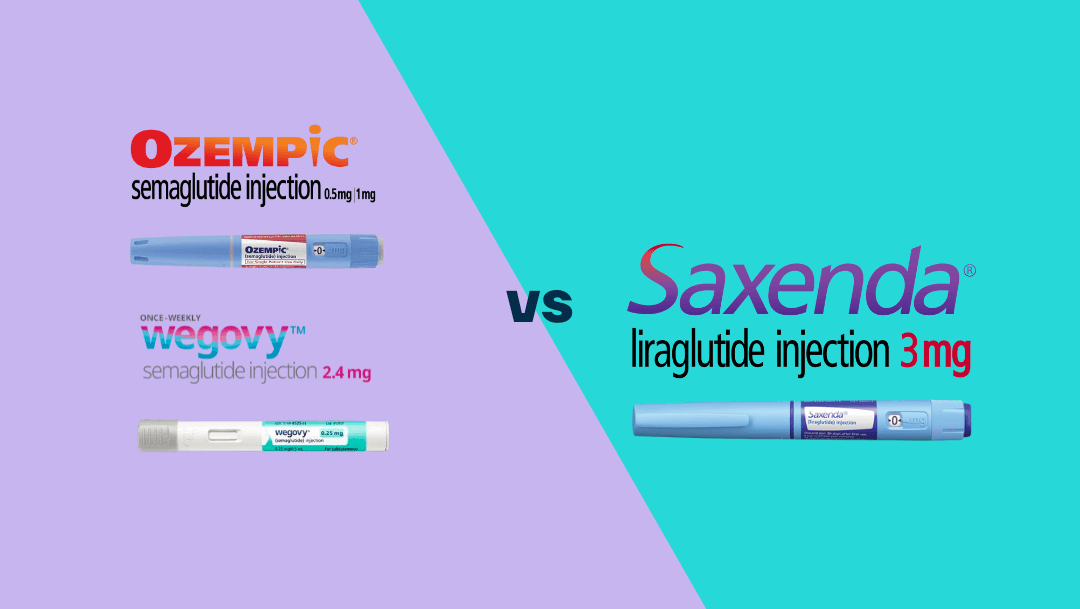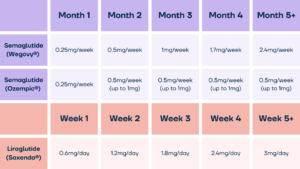Research suggests semaglutide supports more weight loss than liraglutide.
However, the studies used to compare the two drugs were from individual trials, comparing one of the medications with a placebo (a sugar pill). They hadn’t yet been compared directly with one another.
The results showed that the 2.4mg semaglutide group participants lost 15.8% of their body weight compared to 6.4% in the 3mg liraglutide group.
2) What’s better for blood sugar, semaglutide or liraglutide?
The meta-analysis mentioned above also measured HbA1c (average blood sugar levels) and found that semaglutide was more effective at lowering HbA1c than liraglutide.
The analysis showed that 1 mg semaglutide reduced HbA1c levels by 0.56% (6 mmol/mol), 0.47% (5.2mmol/mol) and 0.3% (3.3mmol/mol) more than liraglutide 0.6 mg, 1.2 mg, and 1.8 mg.
Similarly, another study found that 1mg of semaglutide leads to an average reduction in HbA1c of 1.8%, compared to 1.3% with liraglutide.
The randomised controlled trial mentioned above investigated the impact of once-weekly 2.4 mg semaglutide and daily 3 mg liraglutide on weight loss and blood sugar in individuals living with obesity but without type 2 diabetes.
The results showed that 2.4 mg semaglutide reduced fasting plasma glucose levels by 8.3 mg/Dl compared to 4.3mg/Dl with 3mg liraglutide. Suggesting semaglutide is almost twice as effective at reducing blood sugar levels than liraglutide.
Another marker of type 2 diabetes is how much insulin is in your blood. Individuals with type 2 diabetes have insulin resistance, often displayed in high insulin levels.
This trial showed that semaglutide reduced insulin levels by 27.8% compared to 15.4% with liraglutide.
Other markers of cardiovascular health, such as blood pressure, triglycerides, and VLDL, were all reduced to a greater extent with semaglutide.
Type 2 diabetes remission
No major trials on these drugs have reported remission, defined as having two blood readings of HbA1c below 48 mmol/mol (6.5%) separated by 6 months alongside the cessation of all type 2 diabetes medication.
However, two trials have reported the percentage of participants reaching the treatment target of an HbA1c below 48 mmol/mol (6.5%) by the end of the intervention.
A randomised controlled trial comparing once-weekly 2.4 mg of semaglutide to placebo in individuals living with type 2 diabetes showed that 67.5% of participants achieved an HbA1c below 48 mmol/mol (6.5%) after 68 weeks.
Similarly, a randomised controlled trial comparing liraglutide to placebo in individuals living with type 2 diabetes found that 56.5% of participants achieved an HbA1c below 48 mmol/mol (6.5%) after 56 weeks.
The number of participants who maintained these lower blood sugar levels and put their type 2 diabetes into remission after the intervention finished is unclear.
However, these studies suggest that both medications have the potential to support type 2 diabetes remission in a significant number of individuals if they’re able to maintain their weight loss and improve their lifestyle.
Key points:
- Semaglutide is more effective at lowering blood sugar levels in both individuals living with and without type 2 diabetes
- However, both medications have shown that a significant number of individuals can reduce their blood sugar levels below the diagnostic threshold of type 2 diabetes
- Although not yet proven, type 2 diabetes is plausible with the use of both medications if these individuals can maintain their changes in the long term
3) Semaglutide vs liraglutide: side effects and safety
All medications have potential side effects, some severe, some mild but uncomfortable. Individual responses to medication will vary greatly, and GLP-1s are no exception.
The most common side effects observed in GLP-1s are nausea, which seems to occur in around 10-20% of participants, and gastrointestinal (GI) symptoms, such as bloating, constipation, and cramping, which affect around 5-10% of participants.
A meta-analysis compared the impact of liraglutide and four other medications we haven’t reviewed in this guide – on weight loss and the risk of adverse effects.
The results showed that while liraglutide was more effective at supporting weight loss, you were also more likely to discontinue the medication due to the severity of the side effects and adverse events.
Interestingly, recent studies suggest that semaglutide is not only more effective at supporting weight loss, but it’s also better tolerated than liraglutide.
A randomised controlled trial was conducted in 2022 investigating the impact of semaglutide and liraglutide on weight loss in individuals living with obesity.
Semaglutide was shown to be more tolerated than liraglutide. 3.2% of participants in the semaglutide group discontinued their treatment due to side effects, compared to 12.6% with liraglutide.
Over 80% of participants in both groups reported GI-related issues such as constipation, cramping, bloating, and diarrhoea.
7.9% of participants in the semaglutide group reported severe adverse events compared to 11% with liraglutide.
All symptoms were most common when doses were increased but appeared to subside after, with milder symptoms continuing throughout the intervention. No deaths were reported in either group.
Beyond this specific trial, a rare and severe side effect of liraglutide is the development of thyroid cancer. If you have a family history of thyroid cancer, you shouldn’t take liraglutide. The relationship between semaglutide and thyroid cancer isn’t clear.
Generally, GLP-1s are well tolerated and don’t appear to cause severe adverse events in most people.
It’s important to note that it’s generally not recommended for women to take GLP-1s while they’re looking to get pregnant, are currently pregnant, or are breastfeeding.
Key points:
- Semaglutide and liraglutide lead to side effects, most commonly nausea and GI issues such as bloating and cramping
- Severe side effects are rare but are more common with liraglutide than semaglutide
- Semaglutide seems to be better tolerated, and fewer people discontinue their medication due to side effects than on liraglutide
- All medications come with risks, and you must consult your healthcare team if you’re concerned about any side effects you experience
Take home message
Weight-loss injections are designed as additional tools for weight management interventions and shouldn’t be considered lifelong medications.
Instead, they should be used to help you kickstart your weight loss and healthy journey while you commit to living a healthier lifestyle.
Consider the use of antidepressants for people living with depression. They’re not designed to cure the condition. Instead, they’re designed to allow room for therapy to treat the condition’s underlying cause.
Mounjaro, and other weight loss injections, like Ozempic and Wegovy, are similar. They can allow you to make lifestyle changes to support long-term weight loss maintenance.
Mounjaro can help silence food-related thoughts and also give you a boost of confidence with more immediate weight-loss results.
This helps to buy you the time and headspace to understand why your body may have struggled to lose weight previously, and to build new long-term healthy habits.
The core focus of our medication programmes is to calm down the feeling of food noise, lower your cravings, and allow you to build healthier habits to keep the weight off for good.
The ultimate goal is to make losing weight feel second nature.
Second Nature’s medication programme
Second Nature currently provides Mounjaro as part of our Mounjaro weight-loss programme.
Why should you choose Second Nature over other medication providers if you’ve decided to try Mounjaro (assuming you’re eligible)?
For peace of mind.
Second Nature has worked with the NHS for over 6 years providing weight-loss programmes across the UK.
While our Mounjaro weight-loss programme is private and not currently used by the NHS, we’ve built the programmes focusing on scientific evidence, patient safety, and data security.
We hope that our 6+ years of working with the NHS and building a track record of effective weight-loss results will give you peace of mind to give us a try.





